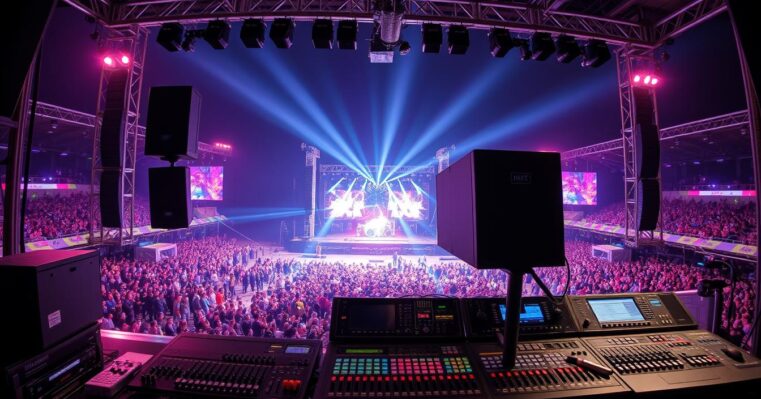Ever wondered why some events are unforgettable while others are forgettable? The answer might be in your sound systems.
Good event audio is key to making events stand out. It's not just about loud speakers. It's about creating feelings, making messages clear, and showing professionalism.
Choosing top-notch event audio equipment means more than just buying speakers. It's about creating an experience. Whether it's a big conference or a small party, the right sound can make all the difference.
Key Takeaways
- Professional sound systems are critical for event success
- Audio quality directly impacts participant engagement
- Proper sound equipment communicates event professionalism
- Different events require customized audio solutions
- Investing in quality sound systems enhances overall event experience
Understanding Event Audio Fundamentals
Creating a memorable event starts with knowing sound system basics. Professional audio components are key to making events stand out. They turn simple gatherings into unforgettable moments.
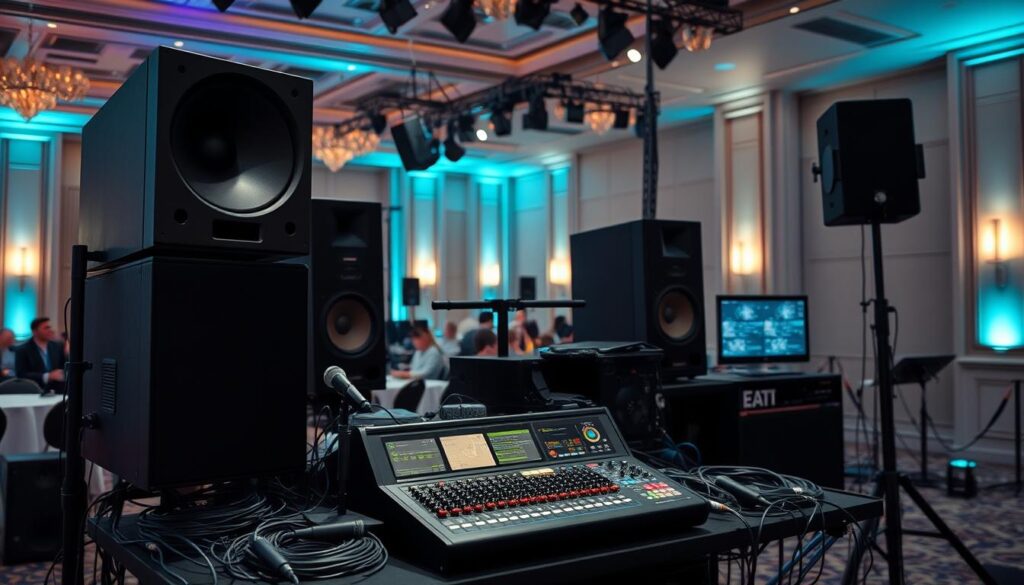
Sound systems are complex networks of technology. They aim to deliver clear audio. Professional sound technicians know each part is crucial for event success.
Key Sound System Components
- Speakers: Primary sound delivery devices
- Amplifiers: Boost audio signal strength
- Mixers: Blend and balance audio inputs
- Microphones: Capture live sound sources
- Signal processors: Refine audio quality
Strategic Sound System Architecture
Building a sound system needs careful planning. Sound engineers place equipment to ensure the best sound reach and audience coverage.
| Component | Primary Function | Impact on Event |
|---|---|---|
| Speakers | Sound projection | Ensures clear audio reach |
| Mixers | Audio signal management | Balances sound levels |
| Microphones | Sound capture | Enables live communication |
"Great sound is invisible, but its absence is immediately noticeable." - Professional Sound Engineer
Role of Audio in Event Success
Your event's atmosphere depends on audio quality. Professional sound equipment creates emotional connections and ensures clear communication. It boosts audience engagement and makes events unforgettable.
Quality Sound Systems for Events: Essential Components
To create an amazing audio experience, you need the right sound system parts. These parts change how your event feels. Experts in event tech know that each piece affects how people enjoy the event.
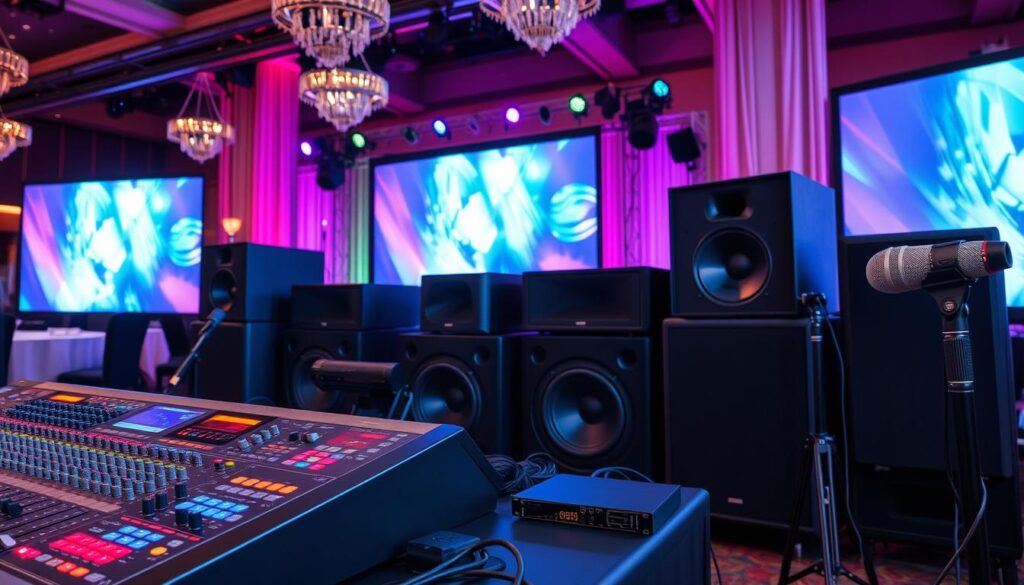
- High-performance microphones
- Professional-grade speakers
- Powerful amplifiers
- Advanced mixing consoles
- Digital signal processors
Choosing the right parts depends on a few things:
- Venue size and how it sounds
- How many people will be there
- What kind of event it is
- How much sound you need to cover
"The difference between an average and an extraordinary event often lies in the quality of its sound system."
| Component | Function | Recommended Type |
|---|---|---|
| Microphones | Audio input capture | Condenser for recording, Dynamic for live events |
| Speakers | Sound reproduction | Active speakers with balanced frequency response |
| Amplifiers | Signal power enhancement | Digital amplifiers with low distortion |
For top event tech, you need precision and adaptability. Wireless systems and audio interfaces make sound flow smoothly in any setting.
Impact of Professional Audio on Event Atmosphere
Sound can turn any event into a memorable experience. Professional audio systems are key in making these moments last. They leave a lasting impression on everyone who attends.
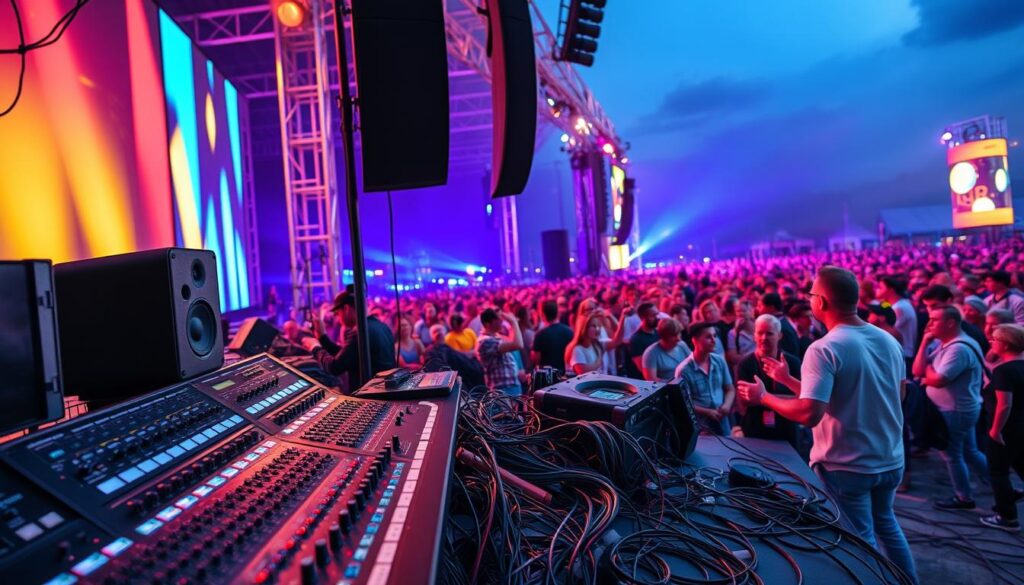
Professional sound management is more than just playing music. It's about creating an atmosphere that touches your audience's hearts. This connection is what makes an event unforgettable.
Creating Emotional Connections Through Sound
Sound has a big impact on how we feel at events. High-quality audio systems can:
- Trigger specific emotional responses
- Enhance audience engagement
- Create memorable sensory experiences
"Great sound doesn't just fill a room - it fills hearts and minds."
Ambient Audio Management
Effective audio impact comes from smart sound distribution. Professional technicians set up sound systems to ensure:
- Balanced sound coverage
- Minimal acoustic interference
- Optimal listener experience
Volume Control and Distribution
Getting the volume right is crucial for the perfect atmosphere. Expert sound management means:
- Adjusting volume levels for different event segments
- Preventing audio distortion
- Ensuring clear communication
Investing in professional audio equipment from brands like Bose and Pioneer ensures an amazing sound experience. This boosts your event's quality and impact.
Professional Audio Equipment Selection Guide
Choosing the right audio equipment for your event is key. It can make or break the sound experience. Knowing how to pick the best equipment is crucial for great sound at your event.
"The right audio equipment transforms an ordinary event into an extraordinary experience."
When picking audio equipment, think about these important things:
- Venue size and how sound moves in it
- How many people will be there
- The type of event and what sound you need
- How much you can spend
Different events need different sound setups. A corporate conference needs different gear than a wedding or concert.
| Event Type | Recommended Equipment | Sound Coverage |
|---|---|---|
| Corporate Conference | Wireless lavalier microphones, digital mixer | Focused, clear speech reproduction |
| Wedding Reception | Portable PA system, handheld microphones | Wide area coverage, music playback |
| Live Concert | Professional line array speakers, multiple microphones | High-power sound distribution |
Key items for your event tech guide are:
- Microphones (handheld, lapel, podium)
- Mixing consoles
- Speakers and amplifiers
- Signal processors
Pro tip: Always talk to audio experts. They can give you advice that fits your event perfectly.
Good audio equipment means clear sound and a professional look. It will impress your audience and make your event memorable.
Sound System Setup and Configuration
Creating the perfect audio experience needs careful planning. Your event's success depends on precise audio setup. This setup must meet the venue's needs and the audience's expectations.
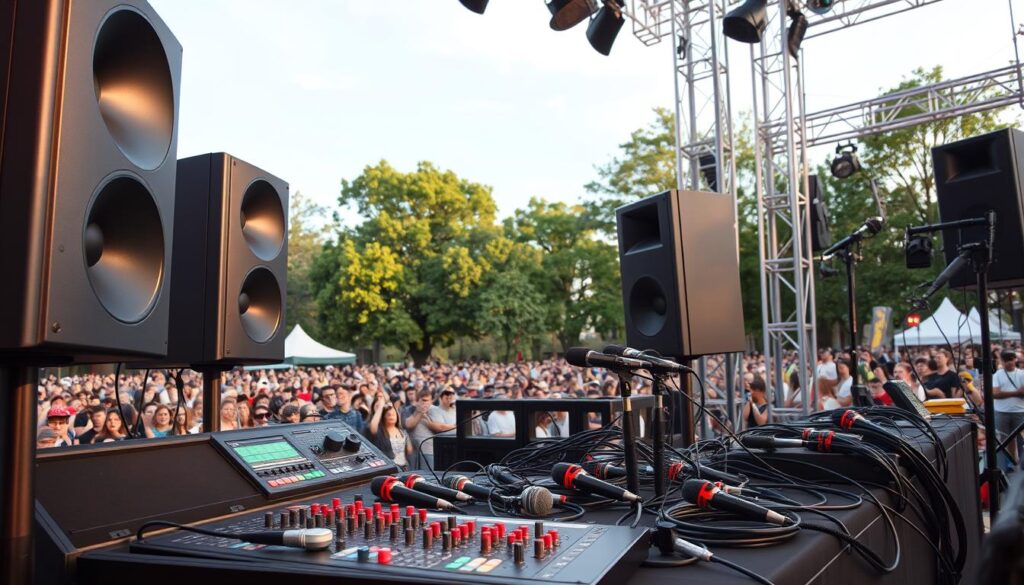
When setting up a sound system, many factors are crucial. Different events need unique audio solutions. This ranges from small business meetings to big concerts.
Speaker Placement Strategies
Effective speaker placement is key to sound quality. Here are some strategies to keep in mind:
- Analyze venue acoustics before placing speakers
- Minimize sound reflection and potential interference
- Use line array systems for wide, even sound distribution
- Position speakers for balanced audio coverage
Audio Coverage Planning
Good audio coverage ensures everyone hears well. Consider these factors:
- Venue size and shape
- Expected audience capacity
- Potential acoustic challenges
- Specific event audio requirements
Equipment Testing Protocol
Thorough equipment testing is vital. Professional sound technicians suggest:
- Conducting detailed sound checks before the event
- Fine-tuning EQ settings for clear vocals
- Verifying microphone and speaker functionality
- Having technical support available during the event
*"Proper sound system setup is an art and science that requires precision and expertise."*
Your aim is to create an immersive audio experience. This should enhance the event's atmosphere and engagement.
Benefits of High-Quality Audio Solutions
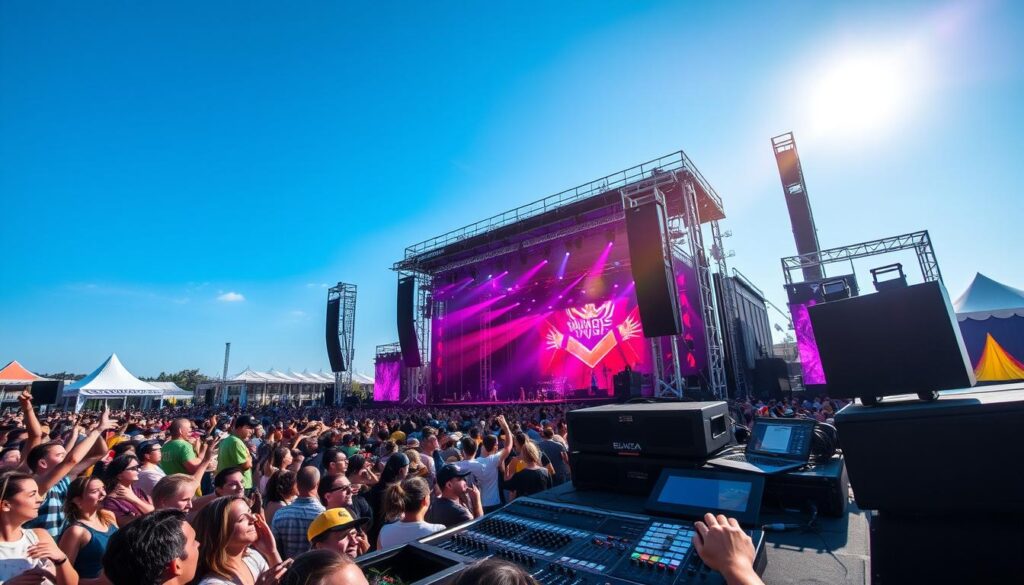
When planning an event, the audio quality is key. High-quality audio solutions do more than just play sound. They create immersive experiences that grab and hold the audience's attention.
The benefits of professional sound systems go beyond just sound. They change events by:
- Enhancing audience engagement with clear audio
- Improving message retention and communication
- Creating emotional connections with precise sound
- Reducing distractions and background noise
Professional sound quality is vital in all events. From corporate conferences to live performances, top-notch audio equipment makes sure everyone feels part of the event.
"Sound is 50% of the event experience. Get it right, and you'll create memories that last."
Choosing professional audio means looking at key parts like high-caliber speakers and robust amplifiers. These ensure an amazing event experience with even sound and clear audio.
Studies show good sound quality affects how people feel and see an event. By focusing on audio quality, you're not just playing sound. You're creating a full sensory journey.
Common Audio Challenges and Solutions
Dealing with sound system issues needs smart audio troubleshooting and acoustic management. Event pros face many technical hurdles. These can greatly affect sound quality and the audience's experience.
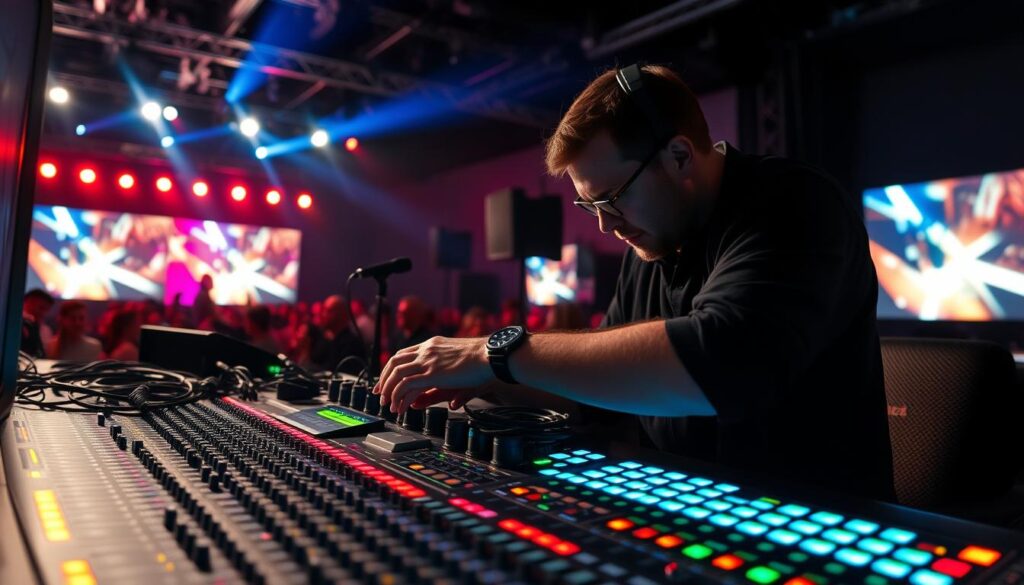
Knowing these challenges helps make sound experiences smooth across various event settings. Let's look at some key audio challenges and how to solve them.
Acoustic Environment Management
Good acoustic management means tackling sound reflections and absorption. Here are some key strategies:
- Use sound-absorbing materials like acoustic panels
- Strategically position speakers to minimize echo
- Conduct pre-event venue sound assessments
- Select appropriate acoustic treatments for specific spaces
Feedback Prevention
Feedback from microphones and speakers can mess up event audio. To avoid this, try these steps:
- Careful microphone placement
- Implementing graphic equalizers
- Using directional microphones
- Maintaining proper gain structure
Interference Elimination
External interference often causes sound system problems. To manage this, do the following:
- Identifying potential frequency conflicts
- Using wireless frequency coordination
- Implementing proper cable management
- Selecting high-quality audio equipment
Effective audio troubleshooting requires technical expertise and strategic planning.
By using these acoustic management techniques, you can greatly enhance sound quality. This will make your events unforgettable.
Audio Integration with Visual Elements
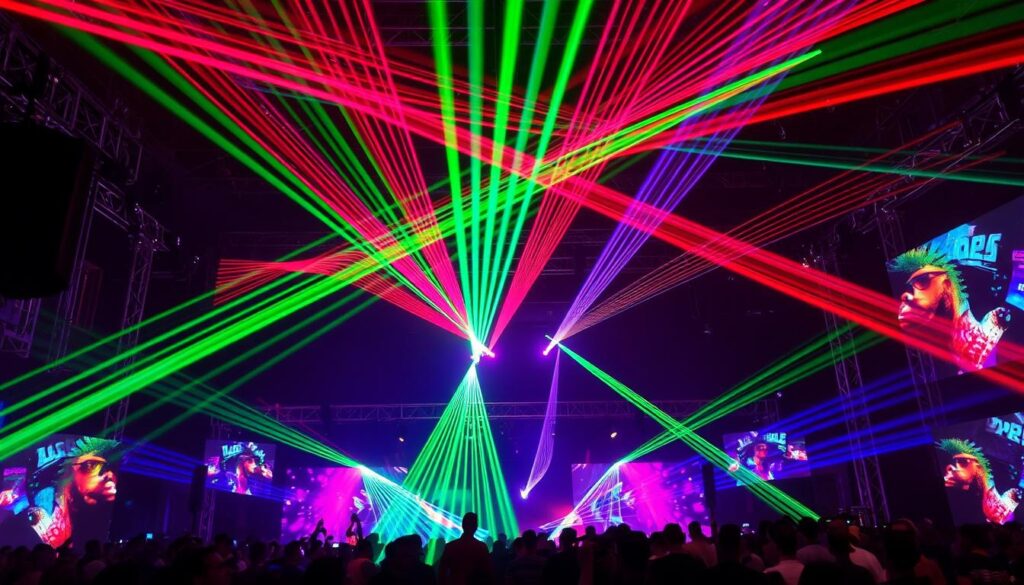
Creating great multimedia events needs smart audio-visual integration. It turns simple presentations into amazing experiences. The key is in perfect AV synchronization, linking sound and visuals to grab your audience's attention.
Experts in event production know it's more than just technical setup. It's about making a journey that touches people on many levels.
"Perfect audio-visual synchronization transforms an event from ordinary to extraordinary." - AV Technology Expert
Key Strategies for Effective AV Integration
- Align audio cues with visual transitions
- Match sound intensity with visual dynamics
- Coordinate lighting with audio rhythms
- Synchronize video content with background music
Essential AV Synchronization Techniques
| Technique | Purpose | Impact |
|---|---|---|
| Sound Mapping | Precise audio placement | Enhanced spatial awareness |
| Visual Timing | Align visual elements | Smooth presentation flow |
| Frequency Matching | Harmonize audio-visual frequencies | Immersive audience experience |
Multimedia events need smart audio-visual integration. Using top-notch synchronization techniques, you'll make unforgettable experiences. These will stay with your audience long after the event ends.
Choosing the Right Sound Equipment for Different Events
Choosing the right audio equipment is key for memorable events. The sound equipment you pick can make or break an event's vibe and success.
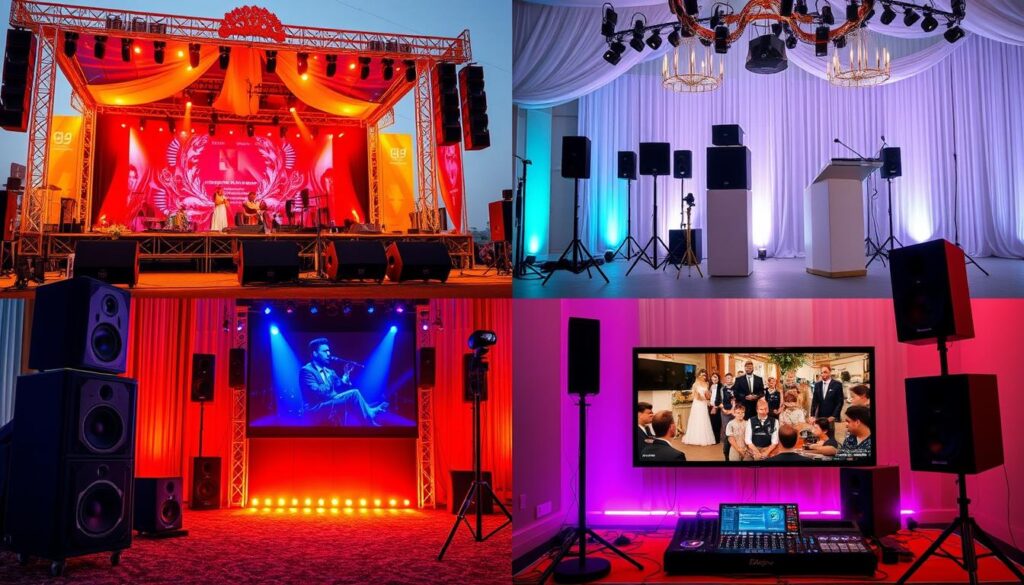
Professional audio needs vary by event type. Knowing your venue's acoustics helps you choose the right sound system.
Corporate Events and Conferences
Corporate events need clear sound for speeches. Important audio gear includes:
- Portable PA systems with clear speech reinforcement
- Wireless microphones for presenters
- Mixing consoles for precise audio management
Weddings and Social Gatherings
Social events need sound systems that work for speeches and music.
| Event Type | Recommended Equipment | Key Considerations |
|---|---|---|
| Wedding Ceremony | Compact speakers, wireless lavalier microphones | Clear speech, background music capability |
| Reception | Full-range speakers, DJ sound system | Dynamic volume control, music variety |
Concert and Performance Venues
Live shows need strong sound systems with special features:
- Line array speakers for wide sound coverage
- Subwoofers for rich low-frequency sound
- Professional mixing consoles with effects processing
The right audio setup transforms an ordinary event into an extraordinary experience.
Investing in professional audio solutions boosts audience engagement and event success. Matching sound equipment to your event needs ensures the best sound.
Investment Considerations for Event Audio
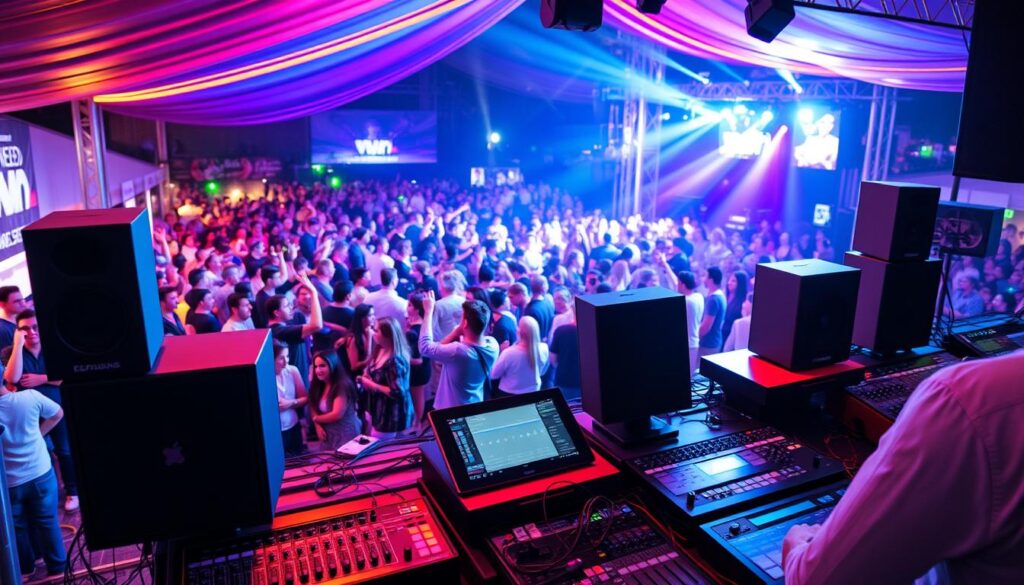
Planning your audio budget is more than just looking at prices. The cost of a sound system is an investment in your event's success. It's known that good audio makes your event better for everyone.
When looking at audio technology investments, think about these important points:
- Long-term ROI on event technology
- Equipment durability and performance
- Scalability for future event needs
- Technical support and maintenance options
"Quality audio isn't an expense—it's an investment in audience satisfaction."
Your sound system cost should cover both now and later. Cutting corners on audio can ruin your event's quality. Good equipment means clear sound, less trouble, and a better experience for everyone.
Important things to consider when investing include:
- Initial equipment purchase price
- Potential rental versus ownership costs
- Maintenance and upgrade expenses
- Technical training for staff
Smartly planning your audio budget shows you care about great events. By focusing on sound quality, you'll make moments that people will remember for a long time.
Working with Professional Audio Technicians
When planning an event, working with skilled audio professionals can make a big difference. Sound engineers add a level of expertise that takes your event's sound to the next level. They know how to handle different venues and event types.
Sound engineers do many important things in event production:
- They pick the right equipment for the event.
- They set up the audio system carefully.
- They keep an eye on sound quality in real time.
- They fix technical problems right away.
"Professional audio technicians are the unsung heroes who ensure your event sounds perfect." - Audio Production Expert
The event production team is key to a great audio experience. They check the venue's acoustics, choose the right microphones, and manage sound distribution. This ensures everyone can hear and enjoy the event.
When looking for audio professionals, look for these skills:
- They need to know a lot about technology.
- They should be able to solve problems quickly.
- They need to be flexible for different event settings.
- They should understand sound well.
Choosing experienced sound engineers means your event's audio will be top-notch. This creates unforgettable experiences for your audience.
Maintenance and Care of Sound Systems
Keeping your audio equipment in top shape is key to its performance and life span. It's not just about cleaning. It's about using smart maintenance to protect your investment.
For audio equipment maintenance, a clear plan is essential. Sound experts suggest several important steps to keep your systems running smoothly:
- Do monthly checks on all audio parts
- Look at cable connections and signal quality
- Clean with electronic cleaning solutions
- Keep equipment in stable temperatures
Regular Equipment Checks
Regular checks are vital for sound system care. Your routine should include:
- Test cables for damage and signal issues
- Check connector health
- Update digital audio firmware
- Check sound quality and system performance
Troubleshooting Procedures
Having a solid troubleshooting plan is crucial. It helps avoid downtime and damage. Techs advise making a checklist for common problems to solve them fast.
| Issue | Potential Cause | Recommended Action |
|---|---|---|
| Signal Interference | Cable Damage | Replace Cables |
| Sound Distortion | Incorrect Gain Settings | Recalibrate Audio Levels |
| No Sound Output | Loose Connections | Check Connection Points |
Storage and Transportation
Right storage and transport are vital for your equipment's safety. Use padded cases, keep away from extreme temps, and handle with care to avoid damage.
"Precision in maintenance determines the longevity of your sound system" - Professional Audio Technician
Conclusion
Understanding the importance of event audio is key to creating unforgettable moments. The success of your event depends on the sound quality. It turns simple gatherings into extraordinary experiences.
Professional audio solutions are more than just technical tools. They are strategic investments that boost audience engagement and perception. They make your event stand out.
Sound systems do more than play music. They create emotional connections and guide the audience's experience. They ensure clear communication in any venue.
Whether it's a corporate conference, wedding, or concert, the right audio equipment is crucial. It can turn a standard event into an unforgettable one.
Professional audio technology keeps getting better. It offers advanced options for event planners. With better speakers, microphones, and sound engineering, you can create immersive audio environments.
Investing in high-quality sound equipment is a smart choice. It enhances the overall quality of your event. It's not just an expense.
Remember, sound is a powerful tool for creating connections. By focusing on professional audio solutions, your events will leave a lasting impact. They will resonate with audiences long after the event.
FAQ
What are the most critical components of a professional sound system?
A top-notch sound system includes high-quality microphones, speakers, and amplifiers. You also need a mixing console. Don't forget wireless systems, digital processors, and audio interfaces for full coverage.
How do I choose the right sound equipment for my specific event?
Pick audio gear based on your event, venue size, and needs. Think about speaker power, microphone types, and mixing console features. Getting advice from audio pros can guide your choice.
Why is professional audio important for event success?
Professional audio boosts audience engagement and ensures clear communication. It creates emotional connections and sets the right mood. High-quality sound makes your event more professional and memorable.
What are common audio challenges during events?
Issues like poor acoustics, feedback, and signal interference are common. To fix these, use smart speaker placement and sound-absorbing materials. Proper microphone setup and cable management also help.
How much should I invest in event audio equipment?
Think about the long-term benefits and costs. Quality, scalability, and future use are key. Spending on good audio equipment is worth it for a successful event.
Do different types of events require different audio solutions?
Yes, they do. Corporate events need clear speech, weddings versatile systems, and concerts powerful PA systems. Each event has unique audio needs.
How important is it to work with professional audio technicians?
Working with pros is essential. They know how to choose and set up equipment. They handle venue challenges and provide on-site support.
What maintenance is required for sound systems?
Regular maintenance includes testing cables and inspecting connectors. Update firmware and have a troubleshooting plan. Proper storage and transport protect your equipment.
How can I ensure optimal sound distribution in my venue?
For great sound, plan speaker placement and audio coverage carefully. Test and calibrate your system. Sound checks before the event help avoid issues.
What role does audio play in creating event atmosphere?
Audio is key in setting the event's mood and energy. Choose music and sound effects wisely. Proper volume control enhances the attendee experience.

